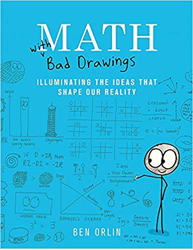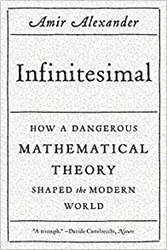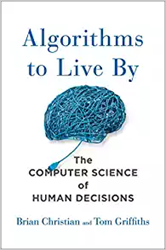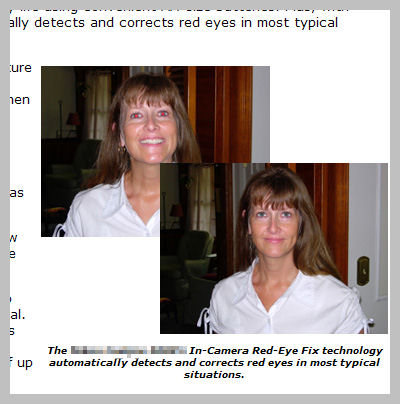Beach Math Reading
There you are, sprawled on a poolside lounge chair in the afternoon heat as reggae music drifts by. Gentle splashing sounds mingle with the hum of the hot tub. A frozen margarita rests within easy reach of your dangling arm. From this languor, one clear thought forms: MATH READING. You need a stack of math books to keep you company!
My friend, you’ve come to the right place. Before any more of this lovely summer passes (if you’ll forgive my northern hemispherical bias), allow me to suggest some excellent options for your vacation reading.

Math With Bad Drawings by Ben Orlin
This is a joyous book compiled from material that originally appeared in a blog with the same name. Ben Orlin’s gift is that he is able to think like a teacher, like a student, and like a practicing mathematician. Oh, and draw like a child. So often math is taught to the drowsing student with no sympathy for what the mathematical landscape looks like to practicing mathematicians. But to someone who loves the subject, math is not a deadening series of exercises. It’s a living theme park pulsating with entertainment and enlightenment. Follow Orlin on a romp through a variety of mathematical ideas. His drawings are simple (not bad), but his ideas are sharp and lively.

A Mind at Play by Jimmy Soni and Rob Goodman
This is a biography of Claude Shannon, the man who invented, seemingly from whole cloth, the theory of information that underpins digital communication. It’s a delight to read because Shannon seems to have enjoyed an ideal life, one that we can all wish for. At the beginning, he was anxious and isolated. But having made his breakthrough, he had the good sense to let himself off the hook and enjoy life. As the title suggests, this book talks not only about his work, but about the playfulness that was integral to how his brain worked. We can’t all be as smart or as original as Claude Shannon, but we can learn the lesson that you really need to make time for whatever it is that you find deeply amusing. Grinding away forever on someone else’s agenda is no way to live. And that is why you would see Shannon trundling through the hallowed halls of Bell Labs on his unicycle.

Infinitesimal by Amir Alexander
This is the story of a very big elephant and the very small mouse that frightened it. The elephant was prevailing wisdom in Western mathematics, and the mouse was, quite literally, the smallest thing that can be named: the infinitesimal. There are many stories about ideas of disruptive change, but there’s something especially amusing about the fact that infinitesimals were considered so perverse, so grotesque and subversive, that mathematicians in some regions were forbidden to even speak of them. Nevertheless, notions of the infinitesimal (and its big brother, the infinite) did indeed revolutionize mathematics. Like a wild beast slowly tamed, the infinitesimal was horrifying to some and manifestly valuable to others. But even in the hands of people as talented as Leibniz and Newton, it proved remarkably difficult to pin down once and for all. This book tells the story of the taming of the tiniest monster.

Algorithms to Live By by Brian Christian and Tom Griffiths
This is one of my favorite books of recent years. Increasingly, algorithms rule our lives. But what do you know about them? Every question you ask Google passes through the belly of a monster algorithm. Implicitly, you trust the results, but should you? And why? More to the point, if algorithms are so great, how can they help you in your ordinary, non-computerized day-to-day life? The authors of this book make algorithms approachable and accessible. Here are some questions they help you with: How long should you drive around looking for a good parking spot? What’s the best way to organize your bookshelf? The book closes with a genuinely heartwarming meditation on the algorithmic future. While you can learn a lot from the latest research, you don’t need to become a robot. You’ve been programmed pretty darn well by evolution. Instead, computers are getting better at reasoning like you.








Comments
To leave a comment, please click here to sign in to your MathWorks Account or create a new one.